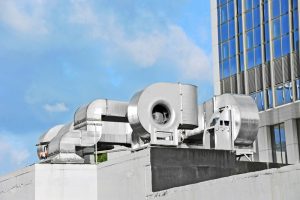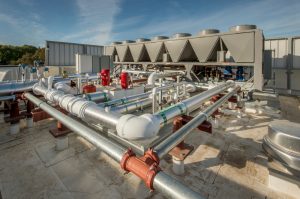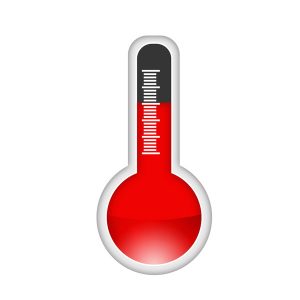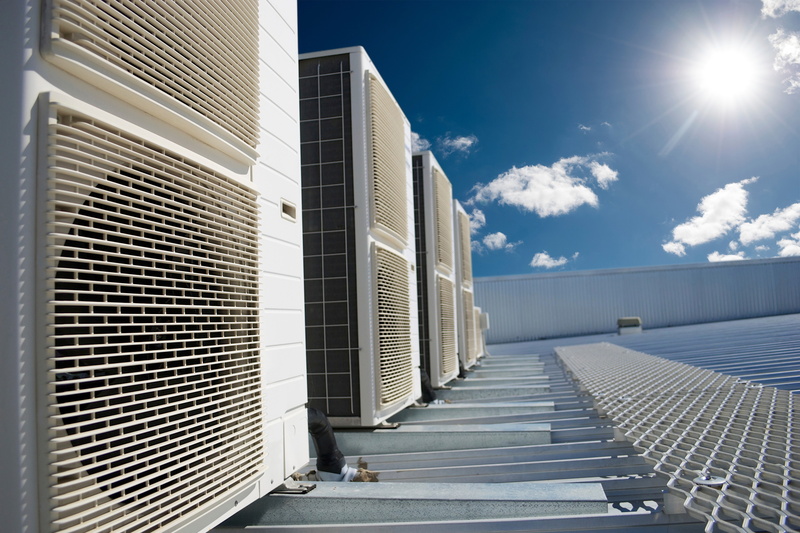![]() If you are shopping for a residential HVAC system, then the term radiant heating has a specific meaning: heating systems that spread warmth through living spaces by raising the temperature of objects in those spaces so heat waves radiate from their surfaces. Boiler systems that use radiators and baseboard heaters or in-floor piping are common examples, and radiant systems can also be powered with electricity.
If you are shopping for a residential HVAC system, then the term radiant heating has a specific meaning: heating systems that spread warmth through living spaces by raising the temperature of objects in those spaces so heat waves radiate from their surfaces. Boiler systems that use radiators and baseboard heaters or in-floor piping are common examples, and radiant systems can also be powered with electricity.
For commercial and industrial purposes, radiant heating is something different, although a similar principle is at work, which is the radiant part. We’ll explain more below.

 You probably often hear about the importance of indoor air quality in buildings. It applies to commercial facilities, industrial facilities, and homes. You may be more focused on climate control inside your commercial facility, balancing heating and cooling to the ideal levels to provide comfort and protect process. But you cannot afford to ignore
You probably often hear about the importance of indoor air quality in buildings. It applies to commercial facilities, industrial facilities, and homes. You may be more focused on climate control inside your commercial facility, balancing heating and cooling to the ideal levels to provide comfort and protect process. But you cannot afford to ignore  It’s never too early in the fall to prepare your commercial HVAC system for the rigors of another winter in the Greater Toronto Area. And we’re already past early fall! If you haven’t yet signed up for our
It’s never too early in the fall to prepare your commercial HVAC system for the rigors of another winter in the Greater Toronto Area. And we’re already past early fall! If you haven’t yet signed up for our  When you own and operate a commercial or industrial facility, you want to find any spot where you can lower overhead costs without having a negative effect on operations. You may not realize it, but too much of your overhead may be going straight to aging and inefficient HVAC equipment. Even with regular maintenance service (and some companies even skip that), older ventilation, heating, and cooling equipment cannot perform at the current higher standards for efficiency.
When you own and operate a commercial or industrial facility, you want to find any spot where you can lower overhead costs without having a negative effect on operations. You may not realize it, but too much of your overhead may be going straight to aging and inefficient HVAC equipment. Even with regular maintenance service (and some companies even skip that), older ventilation, heating, and cooling equipment cannot perform at the current higher standards for efficiency. If you’ve owned a business in Toronto for more than a year, or if you’ve lived here that long, you already have a good idea of how cold it gets during the winters. It gets very cold! The average low during January is -3°C, and the hottest days aren’t much warmer than that. Any business needs to have proper indoor heating, no matter how harsh the winters get. But it’s especially vital in the Greater Toronto Area and it applies to businesses of all types. Protecting everything from customers to equipment and facilitating process are on the line when any commercial heating systems start to fail.
If you’ve owned a business in Toronto for more than a year, or if you’ve lived here that long, you already have a good idea of how cold it gets during the winters. It gets very cold! The average low during January is -3°C, and the hottest days aren’t much warmer than that. Any business needs to have proper indoor heating, no matter how harsh the winters get. But it’s especially vital in the Greater Toronto Area and it applies to businesses of all types. Protecting everything from customers to equipment and facilitating process are on the line when any commercial heating systems start to fail. Chances are high that your commercial or industrial facility uses rooftop units in some capacity. Everything from a standard office building to a sheet metal factory has HVAC units housed on the roof to provide for proper environmental controls around the year.
Chances are high that your commercial or industrial facility uses rooftop units in some capacity. Everything from a standard office building to a sheet metal factory has HVAC units housed on the roof to provide for proper environmental controls around the year. Air conditioning is a word that’s often misunderstood when it comes to the industrial and commercial world. People think of ACs as small systems sending out cool air to provide comfort. But the job of conditioning industrial and commercial spaces often involves systems far different from the air conditioning systems people are used to. For many large facilities, it takes the combined work of chiller and cooling towers to deliver the consistent lower temperatures that make work even possible in the first place.
Air conditioning is a word that’s often misunderstood when it comes to the industrial and commercial world. People think of ACs as small systems sending out cool air to provide comfort. But the job of conditioning industrial and commercial spaces often involves systems far different from the air conditioning systems people are used to. For many large facilities, it takes the combined work of chiller and cooling towers to deliver the consistent lower temperatures that make work even possible in the first place. We’ve experienced a hot summer here in Toronto, and we can expect the temperatures to remain high for the foreseeable future. These conditions place a huge workload on any type of cooling system—but especially for the air conditioning system for a commercial or industrial facility. An air conditioner is not only doing the work of cooling off personnel, clients, and customers in a facility, it also must manage climate control to protect equipment and process. This is one of the reasons commercial and industrial ACs are more complex than residential air conditioning: a commercial AC handles multiple jobs, and the risk of a loss of cooling puts more in jeopardy than just stopping people indoors from sweating.
We’ve experienced a hot summer here in Toronto, and we can expect the temperatures to remain high for the foreseeable future. These conditions place a huge workload on any type of cooling system—but especially for the air conditioning system for a commercial or industrial facility. An air conditioner is not only doing the work of cooling off personnel, clients, and customers in a facility, it also must manage climate control to protect equipment and process. This is one of the reasons commercial and industrial ACs are more complex than residential air conditioning: a commercial AC handles multiple jobs, and the risk of a loss of cooling puts more in jeopardy than just stopping people indoors from sweating. Unless your business is related to the HVAC industry, you probably don’t have much more than a standard working knowledge of commercial heating and cooling systems. Nor do you need to have one—that’s why you have professionals like us around to assist you. So if you’ve ever wondered why rooftop AC equipment is the standard for businesses, we’ve written the post to answer that question and give you some information about how our side of the HVAC industry works.
Unless your business is related to the HVAC industry, you probably don’t have much more than a standard working knowledge of commercial heating and cooling systems. Nor do you need to have one—that’s why you have professionals like us around to assist you. So if you’ve ever wondered why rooftop AC equipment is the standard for businesses, we’ve written the post to answer that question and give you some information about how our side of the HVAC industry works.  The standard way of providing climate control inside most commercial facilities is with the air-source heat pump. You’re most likely familiar with these as the rooftop units found on commercial buildings. They work through refrigeration circulation to move heat either into or out of a facility space. The reason they’re called “air-source” heat pumps is because the use the air both indoors and outdoors for heat transfer.
The standard way of providing climate control inside most commercial facilities is with the air-source heat pump. You’re most likely familiar with these as the rooftop units found on commercial buildings. They work through refrigeration circulation to move heat either into or out of a facility space. The reason they’re called “air-source” heat pumps is because the use the air both indoors and outdoors for heat transfer.